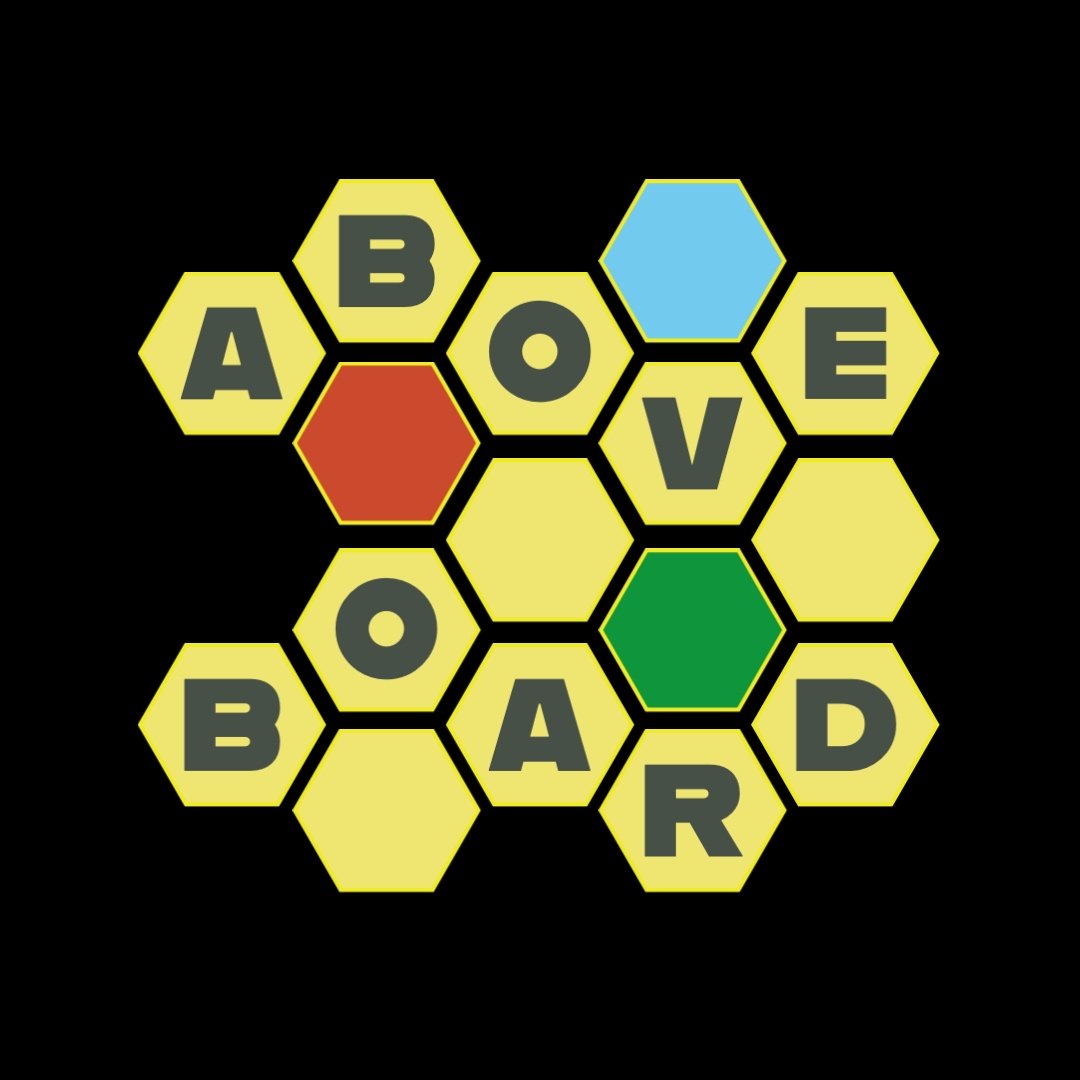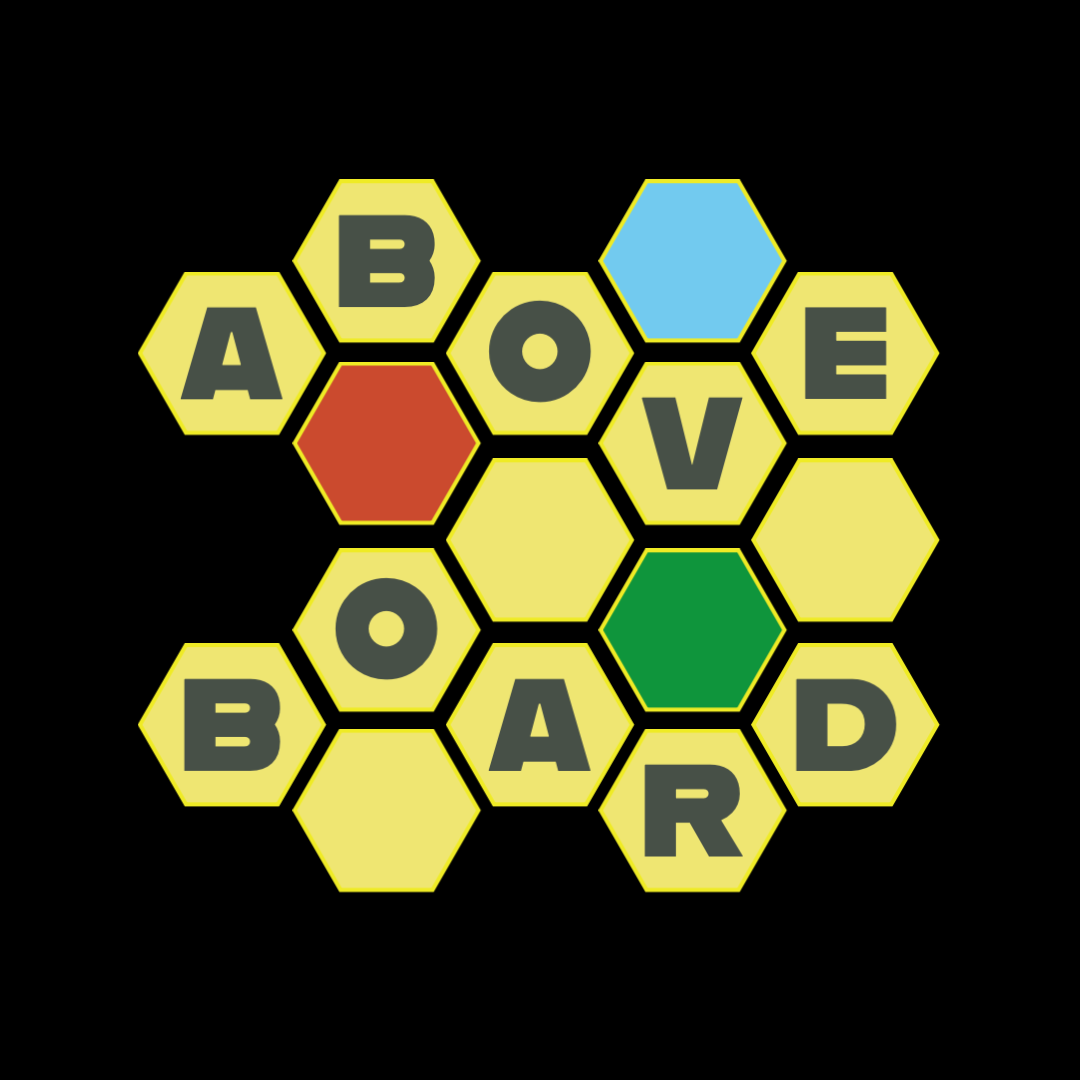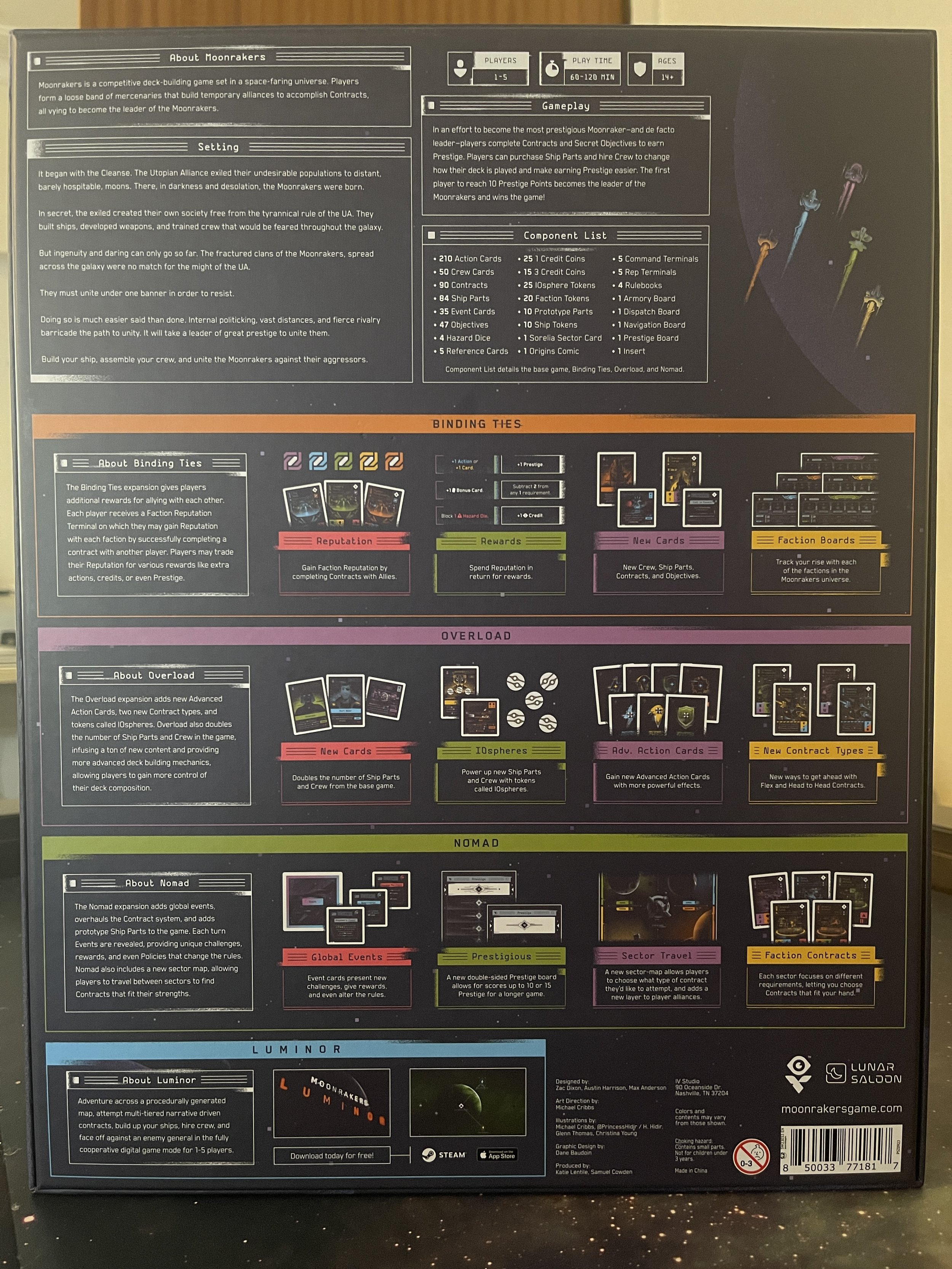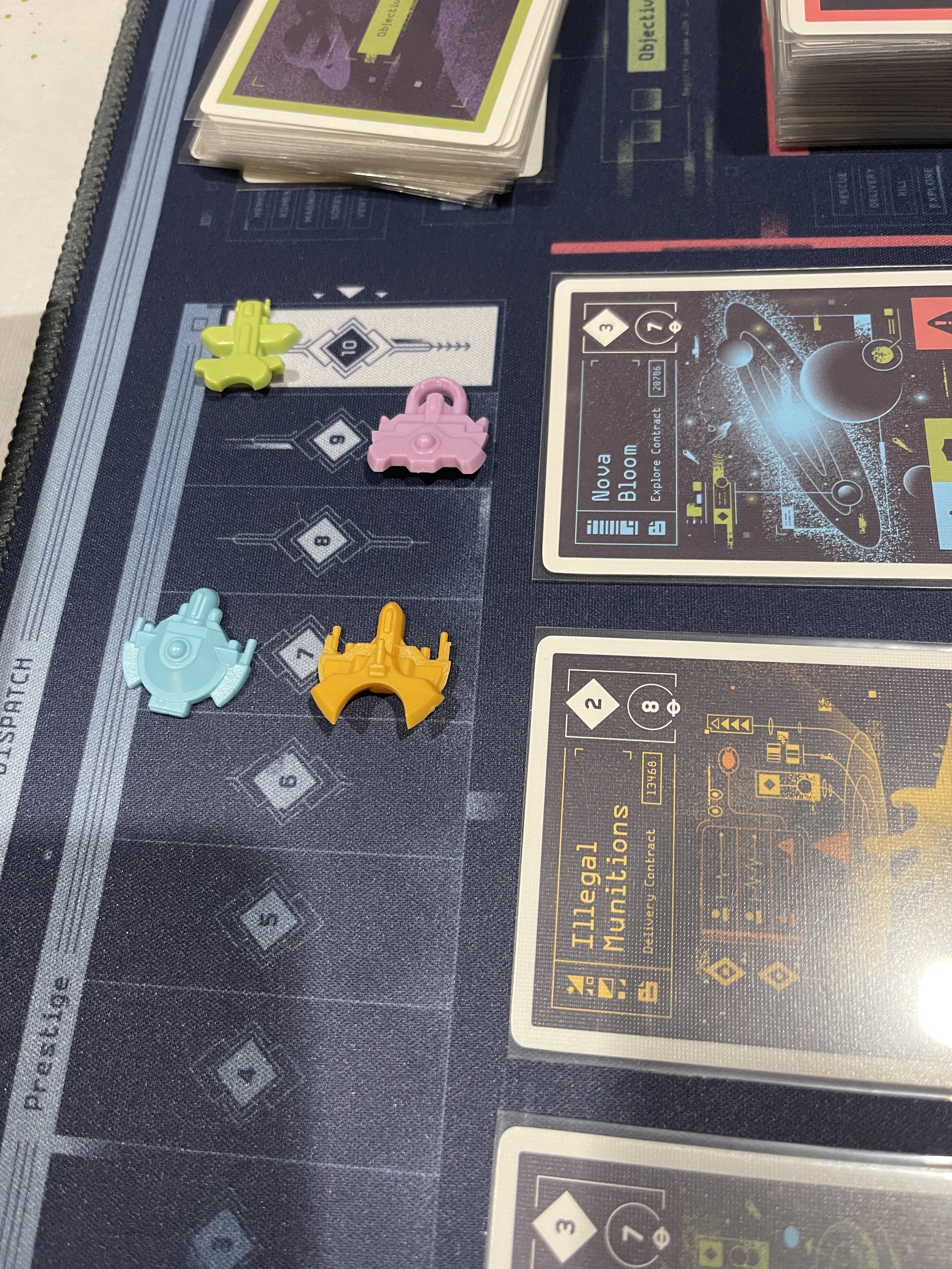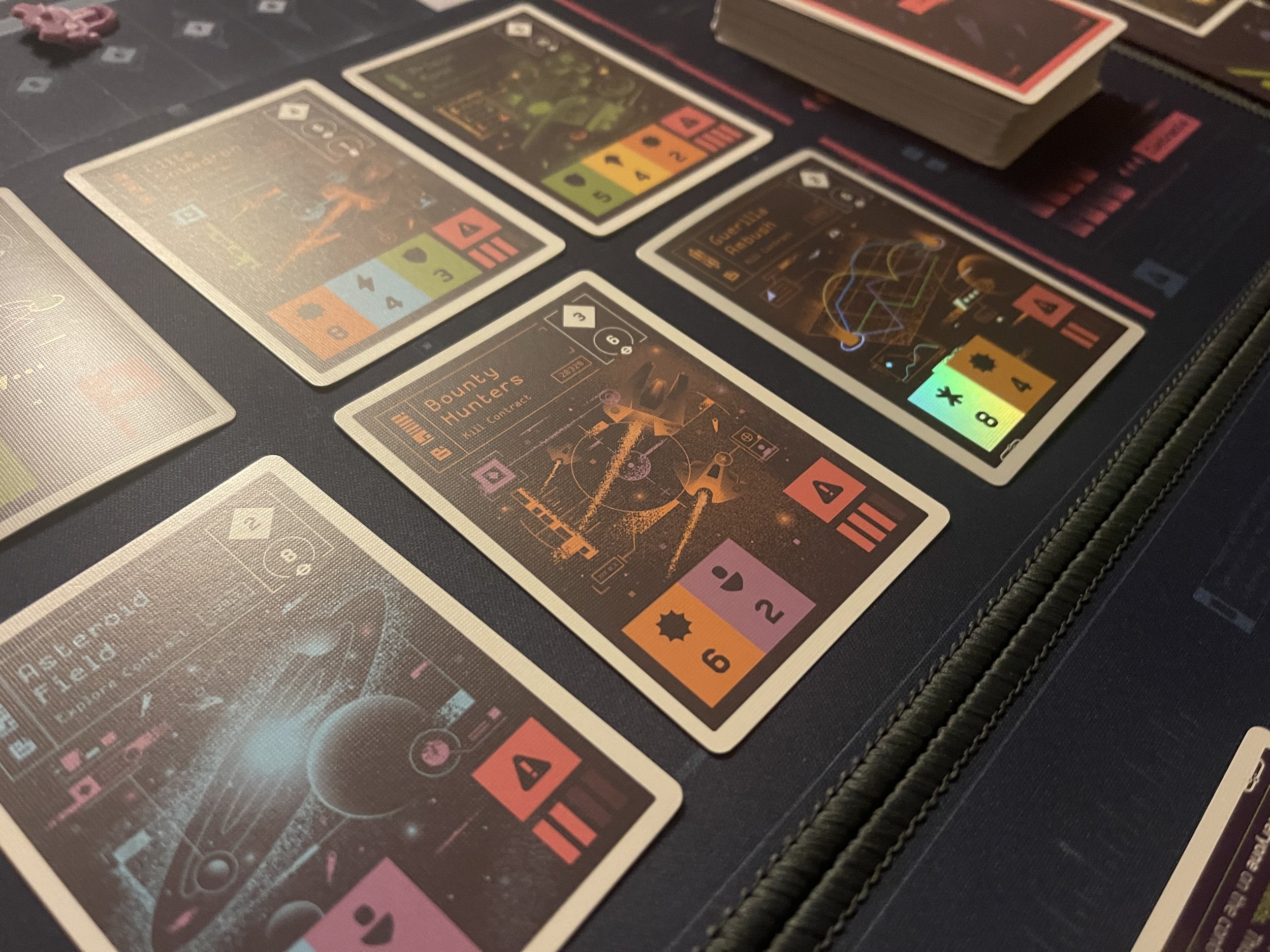Moonrakers Review
Reroute power to shields and set weapons to awesome! The Moonrakers are looking to earn some prestige, but the competition is fierce, so master those negotiation skills or you’ll find yourself scrubbing a faulty airlock!
1-5 Players 60-120 Mins Age 14+
Designers: Max Anderson, Zac Dixon, Austin Harrison
Artist: Lunar Saloon
Publisher: IV Studio
There Was a Button, I Pushed It
Moonrakers is a 1-5 player deck-building and negotiation game from IV Studio. The game follows the exploits of a spacefaring group called Moonrakers who have broken away from the oppressive Utopian Alliance to strike out on their own, living free and fulfilling contracts in order to earn credits and prestige all the while upgrading their ships and recruiting skilled crew to enhance their abilities.
The goal of Moonrakers is to complete contracts, each contract lists the requirements to complete it in the form of card requirements that must be played, as well as rewards for completion and hazards in the form of dice that must be rolled and consequently defended against at the risk of losing precious prestige points.
The gameplay involves many familiar elements for players versed in deck building, but unlike most deck builders which allow or even require players to play every card in their hand, of the more interesting aspects that differentiates Moonrakers is that each player begins their turn with only one action which is the equivalent of playing a single card. In order to play more cards on their turn players will need to play reactor cards, which allow player to take two more actions, in this way, players can begin to chain together successive actions which, if all goes well, can result in powerful turns and allow them to fulfil complex contracts.
For most contracts, the requirements will be too demanding for a single player to complete on their own, this is where the negotiation aspect comes into play. On their turn, the current player as the mission leader, may attempt to negotiate a contract with as few or as many fellow players as they wish, any rewards, such as prestige points, credits or bonus cards are up for negotiation as well as any hazard dice on the contract. The requirements are made up of action cards that must be played in order to fulfil the contract, whereas, whomever rolls the hazard dice must ensure they block or cancel out any hazard results or risk losing prestige. While players are under no obligation to be honest about what they can contribute to a contract, as with any negotiation game, betrayal or dishonesty will self correct in future turns when it comes time for that player to find allies.
Beyond fulfilling contracts, the only other way to gain prestige points in Moonrakers is to complete objectives. Each player begins with two objectives and more can be gained by staying at your base instead of completing a contract, staying at the base also allow you to gain a credit and discard and replace one contract from the market. Staying at the base is a good way to discard an particularly unsatisfying hand of cards as, at the end of each contract you participated in (even if you don’t actually play any cards) or when you stay at base, all cards you played that turn and cards remaining indoor hands are discarded and a new hand is drawn before he next player’s turn.
The More You Share, The More Your Bowl Will Be Plentiful
Moonrakers is a solid, rewarding and above all, utterly satisfying deck building game. The idea of beginning a turn with only a single action, then, though considered purchasing decisions and negotiation skills, building a powerful deck you can cycle through to gain massive, powerful turns is immensely rewarding and demonstrates the very best of what deck builders can provide. Not only are you building a deck, you’re also upgrading your ship with various ship parts that each provide a special ability and often allow you to add more action cards to your deck. Crew cards are another powerful addition that can aid in creating specialised decks focussing on a particular aspect, such as shield or damage, or they can help bring an unbalanced deck back into line by overcoming shortfalls. All ship parts and crew cards are unique, so if you buy one, you know no one else will be getting their hands on it. Depending on how you craft your deck, you could find yourself an indispensable ally.
Player negotiation provides a high level of player interaction and provides some memorable gaming moments. Successfully negotiating and completing a contract feels great and triggers all those lovely endorphins we gamers enjoy. As the game progresses and players find themselves approaching the higher end of the prestige scale, allies will be more difficult to find and more demanding of rewards. Anyone who manages to streak ahead will soon find themselves drifting in space, unable to complete difficult contracts while those players bringing up the rear will find themselves in high demand due to the lower threat they pose. It’s an excellent system that manages to self correct and reduce the chances of a single player gaining an unsurmountable lead and allowing stragglers to stay in the game or even slingshot into the lead. There were some great moments in our games where players who felt they were hopelessly behind managed to catch up and keep themselves competitive right to the end. I much prefer games that keep all the players engaged and maintain a certain tension, that anyone could win. Moonrakers isn’t just about game systems and how well players can manipulate them, but also the social element, do you have the gift of the gab? Can you misdirect enough to gain a vital advantage at a key moment? Moonrakers allows all manner of gamers their time to shine and the more a group plays together, the more they’ll become familiar with one another’s negotiating strategies.
One issue I have with games that have the option to pass is that doing so always feels like a wasted turn, in Moonrakers, staying at base is the equivalent of skipping your turn, only with rewards. Staying at base allows up to five options for players. They can gain an additional objective, they can choose to discard a contract from the contract row, they can gain a credit, they can go shopping and they must discard their current hand of cards and draw up a new hand of five. Not bad for doing the Moonraker equivalent of staying in bed.
With all that I’ve covered so far, I haven’t even touched on the three expansions each of which enriches one of the three main aspects of Moonrakers. The first, Overload, adds more contracts, crew and advanced action cards, which are more powerful version of their standard counterparts and can be purchased from the armoury the same way as the crew and chip parts. Essentially, Overload boosts the the deck building up to 11!
Next is Nomad, this expansion turns its eye towards contract fulfilment, providing new game board featuring five regions of space, each corresponding to one of the five types of contract, rescue, exploration, kill, delivery and uh.. purple? In order to negotiate and complete a contract the mission leader must move their ship marker to the region of their choice and they may only negotiate with players who also travel to that region of space. the first four regions are available from the get go, but the fifth purple region only unlocks after certain conditions have been met. This purple region, Sorelia, rewards players with unique and very powerful ship parts exclusive to that region and only this Nomad expansion. Having each region focus on a single type of contract leans into deck specialisation, allowing players to focus how they choose to upgrade their decks in order to complete specific missions.
The third expansion, Binding Ties, enhances the game’s negotiation. Each player adds a new reputation terminal above their command terminal (player board) and as players complete contracts with one another they owe their allies’ coloured tokens further up the reputation track. The further up the track they move the greater the rewards they unlock. Players can then spent this reputation to gain rewards that range in power from the lower end such as discarding a contract card to the high end, like gaining a prestige point. Overall a fantastic expansion that adds a great deal in terms of reward and making negotiation, particularly in the late game, ore appealing, without a heavy rules overhead.
For any other game, three expansions plus the handful of mini expansions such as Shard and Starfall, each of which provides a handful more contracts, crew and ship parts, would be more than enough gameplay for most. But the folks at IV Studio went a step beyond and created Luminor, a solo and cooperative app-driven campaign that provides a whole new way to experience the game. Rather than gaining prestige points, players work together, guided by the NPCs they encounter during the campaign, to build their decks, upgrade their ships and recruit crew all while exploring the far reaches of the system and overcoming a looming threat. The options change with each play-though and often, cards and abilities will even be adjusted from their printed versions to balance the events of the story. Luminor showcases the same striking graphic design as he physical game and interjects humour and personality into its characters, fleshing out this universe and adding depth to the game.
For us solo enthusiasts, you’ll be pleased to hear that Moonrakers supports solo play by using a ‘mercenary’ player with their own deck whom you can ally with for contracts. The gam changes a little and is limited to 10 rounds with the mercenary’s ship token moving up the prestige track each round. If it hits 10 before you do, the game ends. Scoring works differently in the solo mode but otherwise the core gameplay remains unchanged.
I Fix Ships, Not People
I know, I’ve been gushing about Moonrakers for some time now, but I can assure you that no game is perfect, and Moonrakers isn’t completely off the hook. At 4-5 players, the game can run a little long, this is more to do with the negotiation side than anything else. People love to talk, they get into the spirit of negotiation and before you know it, ten minutes have passed and you’re still working out the details. Depending on your group and how you like to interact, this may not be an issue, but for many, particularly those players not involved in the negotiation, this represents dead time. The rulebook contains a variant for timed negotiation, so I’d recommend any player count above 3 utilise a 1-2 minute limit on negotiations.
Speaking of negotiating, the late game becomes a little bogged down when one or two players are on the cusp of victory, they suddenly find it very challenging to find allies. Though by this stage, the players’s decks should be strong enough to complete smaller contracts on their own. Still, a lot of the fun social elements fall to the wayside by this stage in the game and players can feel like they’re on their own, which is largely true, victims of their own success perhaps? The Binding Ties expansion helps smooth out the endgame somewhat and encourages cooperation, so if you have access to that, I’d highly recommend it.
One complaint that came from my gaming group was that the text on the cards was too small to read from across the table. Granted none of us are exactly spring chickens, but even so, readability was an issue and this was perhaps a case of form over function. Personally, I didn’t have much of an issue with it, after all, picking up the cards to read meant I was able to enjoy the art work.
I Am That Guy
Did someone mention artwork? Having begun life as an animation and design house, IV Studio used their knowledge of graphic design to their advantage in Moonrakers, turning out an absolutely stunning production. Everything from the imagery on the cards and character designs to the player boards with their ship’s schematics akin to computer terminal displays, Moonrakers is in a class of its own when it comes to its look and feel. The game presents a dark and gritty science fiction atmosphere augmented by striking metal coins, snappy, linen finished cards and spot UV player boards. In fact, the only components that let me down were the plastic ships used as score trackers, they felt a little basic compared to the rest of this majestic oeuvre. There are metal upgrades for the ships, dice and other tokens, but as Moonrakers already carried a premium price tag to match its quality, the idea of spending more for what amounted to minor upgrades that didn’t add any gameplay enhancement was a bridge too far for this gamer.
Overall, Moonrakers has a level of fit and finish that is a credit IV Studio’s design team. This was clearly a passion project and one of which they should be rightly proud.
No Risk, No Reward
When all is said and done, Moonrakers is nothing short of an excellent deck building game with a high level of player interaction and negotiation with amazing component quality and graphic design. Even though unfettered negotiation can blow out the game’s length and the end game can potentially drag, I can hands down declare Moonrakers to be my favourite game of all time, sorry Nemesis, we’ll still always have 2020. A polished production, an incredible gameplay experience and a project clearly created by a team who love games and graphic design. If you haven’t had to opportunity to try out Moonrakers, then I urge you to give it a shot, it may not be for everyone, but it’s most certainly for me.
Thank you so much for reading and I hope you found this review of Moonrakers informative. Have you played it yourself? If not, does Moonrakers sound like a game you’d be keen to try? Leave your thoughts in the comments below, or join us on our Above Board Facebook page where you can enjoy updates about forthcoming reviews, or just shoot the breeze about your favourite games. Until next time, have fun raking those moons everybody!
